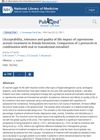 1 citations,
June 2019 in “Innovare journal of medical sciences”
1 citations,
June 2019 in “Innovare journal of medical sciences” Polycystic Ovary Syndrome (PCOS) is a hormonal disorder in women that can cause infertility and other health issues, and it may be improved by treatments that increase insulin sensitivity.
 1 citations,
May 2016 in “The Nurse Practitioner”
1 citations,
May 2016 in “The Nurse Practitioner” Treating PCOS is complex, involving medication like metformin and lifestyle changes, and requires attention to mental health due to high depression and anxiety rates.
 1 citations,
October 2013 in “Journal of Postgraduate Medical Institute”
1 citations,
October 2013 in “Journal of Postgraduate Medical Institute” Metformin helps improve menstrual irregularities and some hormone levels in PCOS patients, but not symptoms like excess hair, acne, or hair loss.
 1 citations,
October 2010 in “Cambridge University Press eBooks”
1 citations,
October 2010 in “Cambridge University Press eBooks” Hormonal therapies are effective for managing hair and skin symptoms in women with PCOS.
 March 2023 in “Scholars international journal of obstetrics and gynecology”
March 2023 in “Scholars international journal of obstetrics and gynecology” PCOS is a complex condition that affects women's hormonal balance and metabolism, requiring lifestyle changes and medical management.
 June 2022 in “Biomedical reports”
June 2022 in “Biomedical reports” STK11 gene variations do not predict how well metformin will work for PCOS, but may affect hair loss and excess hair growth.
 January 2015 in “Springer eBooks”
January 2015 in “Springer eBooks” The document concludes that managing PCOS involves lifestyle changes, medication, and monitoring for associated health risks.
 January 2009 in “Elsevier eBooks”
January 2009 in “Elsevier eBooks” Some plant-based treatments may help with ovary function, insulin resistance, and excess male hormones in PCOS, but more research is needed to confirm their safety and effectiveness.

A young woman with kidney failure had hair loss due to a common hormonal disorder, which improved with hormone therapy.
 June 2003 in “Obstetrical & Gynecological Survey”
June 2003 in “Obstetrical & Gynecological Survey” After chemotherapy for a gestational trophoblastic tumor, normal pregnancy rates are possible, but there's a slightly higher risk of the tumor reoccurring in future pregnancies.
 88 citations,
May 2012 in “Human Reproduction Update”
88 citations,
May 2012 in “Human Reproduction Update” Women with PCOS may take longer to get pregnant but can have a normal family size, and should manage their overall health to reduce long-term health risks.
 30 citations,
June 2019 in “Frontiers in Endocrinology”
30 citations,
June 2019 in “Frontiers in Endocrinology” The document concludes that managing non-classical congenital adrenal hyperplasia in females requires personalized treatment, genetic counseling, and a team of specialists.
 May 2023 in “Metabolites”
May 2023 in “Metabolites” Myo-inositol plus α-lactalbumin works better than myo-inositol alone for improving symptoms of PCOS.
 68 citations,
January 2022 in “International Journal of Molecular Sciences”
68 citations,
January 2022 in “International Journal of Molecular Sciences” PCOS management includes lifestyle changes and medications, with ongoing research into repurposed drugs for better treatment options.
 6 citations,
August 2023 in “Fertility and Sterility”
6 citations,
August 2023 in “Fertility and Sterility” The 2023 guideline for PCOS suggests using updated diagnostic criteria, assessing related health risks, and recommends lifestyle changes and specific treatments for symptoms and fertility issues.
 February 2024 in “IntechOpen eBooks”
February 2024 in “IntechOpen eBooks” Myo-inositol-based treatments greatly improve pregnancy chances for women with PCOS.
 1744 citations,
August 2006 in “The Journal of Clinical Endocrinology and Metabolism”
1744 citations,
August 2006 in “The Journal of Clinical Endocrinology and Metabolism” Polycystic Ovary Syndrome should be seen mainly as a condition of excess male hormones, with a focus on this in its definition.
 16 citations,
September 2018 in “Clinical Biochemistry”
16 citations,
September 2018 in “Clinical Biochemistry” The document concludes that more research is needed to fully understand the causes of PCOS.
 2 citations,
January 2017 in “Cambridge University Press eBooks”
2 citations,
January 2017 in “Cambridge University Press eBooks” Manage PCOS in primary care with weight loss, psychological support, medication, and monitoring for health risks.
 75 citations,
June 1999 in “Pediatric Clinics of North America”
75 citations,
June 1999 in “Pediatric Clinics of North America” The document concludes that early recognition and treatment of PCOS in adolescents is crucial for managing symptoms and long-term health risks.
 4 citations,
December 1994 in “PubMed”
4 citations,
December 1994 in “PubMed” Cyproterone acetate with estradiol improved women's self-confidence and emotional well-being without a difference between oral or transdermal methods, but younger women preferred the oral method.
 4 citations,
August 2021 in “Clinical and Experimental Reproductive Medicine”
4 citations,
August 2021 in “Clinical and Experimental Reproductive Medicine” The 2018 guideline for PCOS suggests new diagnostic criteria and treatments, but recognizes the need for more research.
 3 citations,
May 2023 in “Biomedicines”
3 citations,
May 2023 in “Biomedicines” PCOS causes infertility mainly due to hormonal imbalances, insulin resistance, and chronic inflammation.
2 citations,
January 1986 in “PubMed” Spironolactone improved symptoms in women with hormonal imbalances and had few side effects.

Nanotechnology improves Clomiphene citrate's effectiveness and reduces side effects for treating ovulatory disorders.
 May 2022 in “Maǧallaẗ Buḥūṯ Al-Tarbiyyaẗ Al-Nawʿiyyaẗ (Print)”
May 2022 in “Maǧallaẗ Buḥūṯ Al-Tarbiyyaẗ Al-Nawʿiyyaẗ (Print)” Eating a high inositol diet significantly improves insulin resistance and hormone levels in women with PCOS.
52 citations,
April 2008 in “Therapeutics and clinical risk management” The birth control combination of ethinylestradiol and drospirenone helps treat symptoms of polycystic ovary syndrome.
26 citations,
July 2021 in “International journal of adolescent medicine and health” New treatments for PCOS are improving fertility and managing symptoms better.
7 citations,
May 2014 in “Iranian Red Crescent medical journal” Laser hair removal is effective for hirsutism when combined with treatment for the underlying causes.
7 citations,
April 2008 in “Annals of pharmacotherapy/The annals of pharmacotherapy” Acarbose may improve PCOS symptoms and fertility, but more research is needed.

























